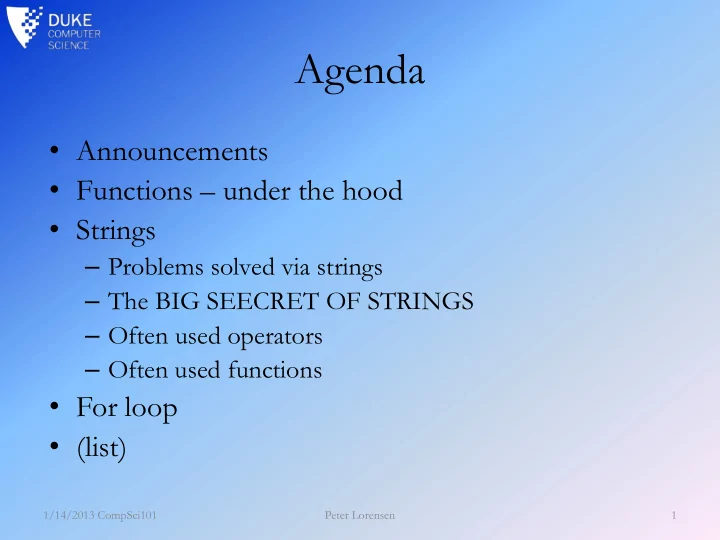

Agenda • Announcements • Functions – under the hood • Strings – Problems solved via strings – The BIG SEECRET OF STRINGS – Often used operators – Often used functions • For loop • (list) 1/14/2013 CompSci101 Peter Lorensen 1
% 1/14/2013 CompSci101 Peter Lorensen 2
University of Washington, Mike Ernst, 2013 How Python executes a function call Formal Function def square(x): parameter definition (a variable) return x * x Actual argument Current expression: square(3 + 4) 1 + square(3 + 4) return x * x 1 + square(7) Variables: x: 7 return 7 * x evaluate this expression return 7 * 7 return 49 1 + 49 50 1. Evaluate the argument (at the call site) 2. Assign the formal parameter name to the argument’s value – A new variable, not reuse of any existing variable of the same name 3. Evaluate the statements in the body one by one 4. At a return statement: – Remember the value of the expression – Formal parameter variable disappears – exists only during the call! – The call expression evaluates to the return value
Strings & Avatar • “Sometimes your whole life boils down to one insane move!” (Jake Sully, Avatar, 2009) • Oftentimes the core logic of a program boils down to one big string move!
Problems that are solved via strings • Problem 1: Web crawler – 1) Get all the links from a web page. – 2) Go to the web pages found and do 1) • Problem 2: Password checker – Are there 8 characters? – Is there at least one number? – Is there at least one capital letter? – Is there at least one symbol? • Problem 3: APT “ Forming Acronyms ” – How do you pick out each word? – How do you pick out the first letter in a word?
The Seecret of Strings • Python sees a String as a sequence • Each character gets a number (2) boy[ 0 ] P boy[ -2 ] e boy = “Peter” boy[ 0:2 ] 0 1 2 3 4 Pe P e t e r boy boy[ 2:4 ] -5 -4 -3 -2 -1 te
A few string operators * + Type Repeat Append str Multiplication Addition (sum) int Operator = Get / assign == Equals Call function . Answer true/false if string in is inside another string
String functions • res = ‘Team Blue Devil wins’ Result with string Function Description res = ‘Team Blue Devils’ returns string upper case version of string res TEAM BLUE DEVILS res.upper() returns int number of (non-overlapping) 1 res.count (‘am’) occurrences of sub in s returns int first index at which sub occurs in 3 res.find (‘m’) s or -1 if no occurrence returns list of s split on whitespace [‘Team’, ‘Blue’, ‘Devils’] res.split() returns list of s split on sep, a delimiter [‘Team B’, ‘ ue Devi’, ‘s’] res.split (‘l’) returns copy of res withOUT leading and Team Blue Devils res.strip() trailing whitespace returns the number of characters in the string 16 len( res ) (including white spaces) returns true if all the characters are in upper case False res.isupper()
Sir Tim Berners-Lee I want you to realize that, if you can imagine a computer doing something, you can program a computer to do that. Unbounded opportunity... limited only by your imagination. And a couple of laws of physics. • HTTP, URL, HTML – How, Why, What, When?
Loops Loops for while while statement: for element in sequence: do this........ do this........ ...... ...... For each element in the sequence While the statement is true please do the following... please do the following... Great for list with well known number Great for all other cases with of elements unkown number of elements
Under the hood of loops adr = “pete@duke.edu” • Loops is the answer for letter in adr: to how you go print letter through a string Pick out all the capital letters of the following sentence: red = ‘Most Wanted Criminel ’ p e t e @ d u k e . e d u result = “” for char in red: if char.isupper(): letter result = result + char print result
Recommend
More recommend